
Can it be done? Some noble restaurants posture themselves as eco-minded and do indeed improve some on the normal American tendency to waste food and materials. But ZERO waste in a commercial food operation?! Ambitious, for sure.
A worthy effort in this direction opened January 2019 in downtown Bellingham, WA (on Commercial Street, across from the Mt. Baker Theater): ANMLY Cafe. This is phonetically pronounced like it looks, more or less, just leaving out a couple vowels (to even conserve letters, perhaps).
Their website – – ANMLYCAFE.COM – – explains an intentional link to the word anomaly: “It means to deviate from the expected, to be anomalous, something different, abnormal, peculiar, even. Here at the café, we take it as an ethos and try to live up to it every day. The result, we hope, is a perennial freshness, a dynamic culture powered by better solutions to problems old and new.”
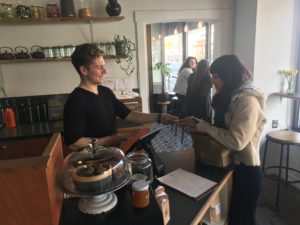 The enterprising driver of this effort, owner and chief chef Emile Diffley, is realistic about his approach, but was so negatively inspired by working in other food service settings where food waste was distressingly extreme that he wanted to do better. After graduating from Bellingham High School in 2013, he also learned about cafe culture by visiting other global regions, including Australia.
The enterprising driver of this effort, owner and chief chef Emile Diffley, is realistic about his approach, but was so negatively inspired by working in other food service settings where food waste was distressingly extreme that he wanted to do better. After graduating from Bellingham High School in 2013, he also learned about cafe culture by visiting other global regions, including Australia.
Now he and his small staff serve just breakfast and lunch (Tuesday–Friday, 8AM–3PM; Saturday, 9AM–2PM), featuring various fresh and bright dishes. (I had a tasty Umami Bowl with a Mimosa for lunch on my first visit.)
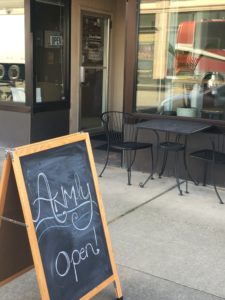 Diffley’s philosophy is to schedule and order food carefully, to avoid undue waste. He’s willing to sell out of a menu item and explain any adjustment to customers, rather than order too much and then have to toss it. He also sources his products, especially coffee and bread, from suppliers who emphasize sustainability, as locally as possible. Food decisions are based on environmental impact, with many meatless options, fewer soy-based products, etc.
Diffley’s philosophy is to schedule and order food carefully, to avoid undue waste. He’s willing to sell out of a menu item and explain any adjustment to customers, rather than order too much and then have to toss it. He also sources his products, especially coffee and bread, from suppliers who emphasize sustainability, as locally as possible. Food decisions are based on environmental impact, with many meatless options, fewer soy-based products, etc.
His goal is a simple and efficient operational mode, both realistic and sustainable, thereby demonstrating a financial and environmental success. It’s a business model that aims “to serve tasty beverages with delicious, nutrient-dense food, and strive for positive environmental change,” minimizing waste.
The motivation of the Zero Waste movement is for anyone/everyone to intentionally, actively aspire for that formidable target, while also understanding that an actual, precise measurement of Nada is an ideal out there to be approached ever more fully. Of course totally zero waste is elusive, but keeping that objective foremost makes all the difference.
Diffley tries not to get overly intense or calculating about it, but still make reasonable (and economical) decisions that promote sustainability. So, for instance, ANMLY Café takes repurposing very seriously, if with a spirit of fun.
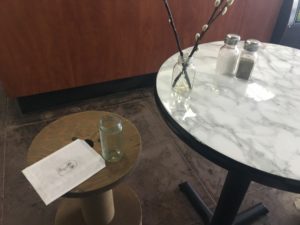 They employ big wooden spools for some seats and old salt & pepper shakers for table vases. They convert their used coffee grounds into an intriguing exfoliant product. Their first line of branded t-shirts were made from recycled material. Etc.
They employ big wooden spools for some seats and old salt & pepper shakers for table vases. They convert their used coffee grounds into an intriguing exfoliant product. Their first line of branded t-shirts were made from recycled material. Etc.
And they use glass jars for cold and take-out drinks, which has proved a bit controversial. Some people walk away upon learning there’s a dollar deposit for a glass jar of coffee to go. But Diffley imagines that eventually people will adapt to the deposit model or get in the (even better) habit of bringing their own refillable drink mug, much like the now-common habit of carrying reusable sacks into the grocery store.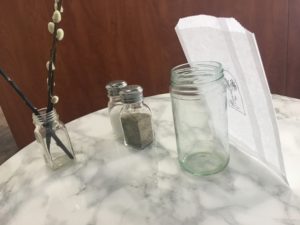
They also make their own sleeves (for hot drink jars) out of fabric scraps from a nearby canvas store. Meanwhile, until a reusable solution emerges they provide no food to-go containers except a small paper packet for breakfast wraps.
And speaking of nearby neighbors, they invite denizens of the Bellingham Towers building above them (as well as immediately local business people) to take a ceramic plate of food with them, promising to return later with the plate. In this way, ANMLY builds trust and community.
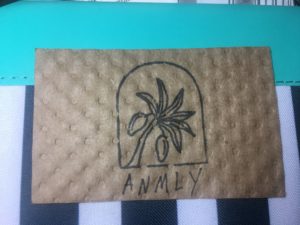 They also rinse all their items before recycling, to minimize contamination, and take any clean soft plastics to the downtown Community Food Co-op recycling bin. Diffley says he has just about convinced his Towers landlord to add Food Plus containers on site for city composting of what organic waste they do need to dispose.
They also rinse all their items before recycling, to minimize contamination, and take any clean soft plastics to the downtown Community Food Co-op recycling bin. Diffley says he has just about convinced his Towers landlord to add Food Plus containers on site for city composting of what organic waste they do need to dispose.
They feature washable cloth napkins, and no straws. (“Not a single person has asked for a straw yet.”) So not much at all goes out to the landfill dumpster. Even their business cards are made out of used cup sleeves from elsewhere (above).
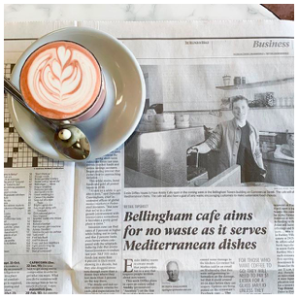 The opening of ANMLY got good press from the Bellingham Herald. Hopefully we’ll be hearing more about this progressive addition to the local foodscape and their sustainable model won’t be much of an anomaly, per se. If you’re in or near Bellingham, and especially if you feel supportive of this ethos, you owe it to yourself to check it out. Enjoy the environs!
The opening of ANMLY got good press from the Bellingham Herald. Hopefully we’ll be hearing more about this progressive addition to the local foodscape and their sustainable model won’t be much of an anomaly, per se. If you’re in or near Bellingham, and especially if you feel supportive of this ethos, you owe it to yourself to check it out. Enjoy the environs!
Many thanks for your good efforts!


